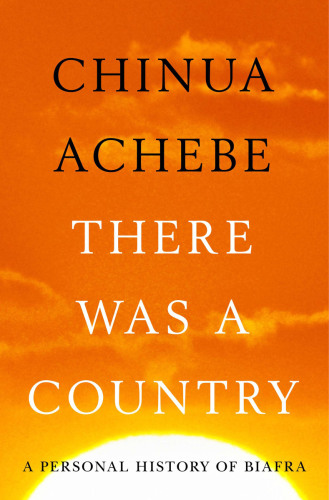
There Was a Country
A Personal History of Biafra
کتاب های مرتبط
- اطلاعات
- نقد و بررسی
- دیدگاه کاربران
نقد و بررسی

December 10, 2012
Achebe's reminiscences of Biafra, a country whichthat spent the entirety of its brief existence, from 1967 to 1970, in civil war with Nigeria, result in an uneasy mix of history and memoir. After an insightful, masterful account of his education, his attention wavers between the individual and the international without settling on a steady tone. Readers will find his legendary gift with imagery in several poems, as well as in details such as Biafran citizens being warned against wearing the colorful clothing most visible to Nigerian bombers, a brilliantly selected example of war's reach into the previously mundane. But the narrative as a whole never coalesces, and after Biafra declares independence it keeps swinging abruptly between the trivial and the heart-stopping: Achebe never unpacks; he tries to stay alive; his wife employs men to redecorate. Nagging questions remain at the end about his stance towards the conflict, during which he served as cultural ambassador for Biafra, while a closing call for "patriotic consciousness" to overcome Nigeria's current problems fails to convince. Only in a concluding poem does Achebe put his finger on the main theme of this stubbornly loyal celebration of unfulfilled possibility: "haunted revelry." Agent: Andrew Wylie, The Wylie Agency.

July 1, 2012
The eminent Nigerian author recounts his coming-of-age during the now scarcely remembered civil war of 1967-1970 that sundered his country. An Igbo by birth and heritage, born into a deeply Christian family in 1930, Achebe (The Education of a British-Protected Child: Essays, 2009, etc.) grew up at a time when British colonial rule was at its orderly zenith and educational institutions in Nigeria were first-rate. These schools turned out the imminent Nigerian leaders and pioneers of modern African literature, who would assume power and position as Nigeria marched to independence in 1960. Yet within the vacuum left by the departing British, Nigeria became "a cesspool of corruption and misrule," with the numerous ethnic groups vying for power, especially the dominant Igbo in the east, the Yoruba on the coast, and Hausa/Fulani in the north. The Igbo were increasingly resented and persecuted for their education, competitive individualism and industriousness. The coup of Jan. 15, 1966 was ostensibly led by Igbo military leaders and was countered by bloody assassinations six months later, followed by pogroms against the Igbo by northerners. Igbo refugees flooded the Eastern Region, which refused to recognize the Nigerian government led by Lt. Col. Yakubu Gowon; the consensus was building across the East, led by Col. Odumegwu Ojukwu, that "secession was the only viable path." The East was declared the Republic of Biafra on May 30, 1967, with the full backing of the Constituent Assembly and the best Igbo minds of the time, including Achebe. The arrangement proved disastrous, as Gowon aimed to crush the insurrection at all costs, starving Biafra by blockade and creating a global humanitarian disaster that killed an estimated 3 million, mostly children. Achebe looks at all sides of the conflict, inserting poems he wrote at the time and tributes to Nigerian writers and intellectuals. A powerful memoir/document of a terrible conflict and its toll on the people who endured it.
COPYRIGHT(2012) Kirkus Reviews, ALL RIGHTS RESERVED.

May 1, 2012
Best known for the novel Things Fall Apart, which has sold ten million copies worldwide since 1958, the award-winning Achebe lived through the Nigerian civil war of 1967-70, when Biafra attempted to secede and found its borders blockaded. The result was mass starvation. Achebe, who served the nascent state as roving ambassador, recalls the horror he saw. More than memoir or history, this book is an argument that literature must bear witness.
Copyright 2012 Library Journal, LLC Used with permission.

September 1, 2012
In this memoir, prominent Nigerian novelist Achebe (Things Fall Apart, 1959) shares his experience of the Nigerian Civil War (also known as the Biafran War) through historical narrative, personal recollections, an interview, and the occasional verse. A prominent intellectual and supporter of Biafran independence, Achebe had been openly critical of the Nigerian government; his novel A Man of the People even anticipated the military coup that launched the conflict. But he was also horrified by the brutality of the war and torn between his sympathy for the Biafran cause and his disappointment with the leaders of the Biafran independence movement. Writers were in a particularly difficult position, suggests Achebe: they could not blame the conflict solely on the colonial past, yet they also needed to accept that Nigeria needed to liberate itself anew, this time not from a foreign power but from its own corrupt, inept brothers and sisters. And as the civil war fades into history, Achebe warns that the root causes of the conflictpolitical ineptitude, ethnic bigotry, corruption, oil-boom petrodollarsremain present in modern-day Nigeria.(Reprinted with permission of Booklist, copyright 2012, American Library Association.)

























دیدگاه کاربران